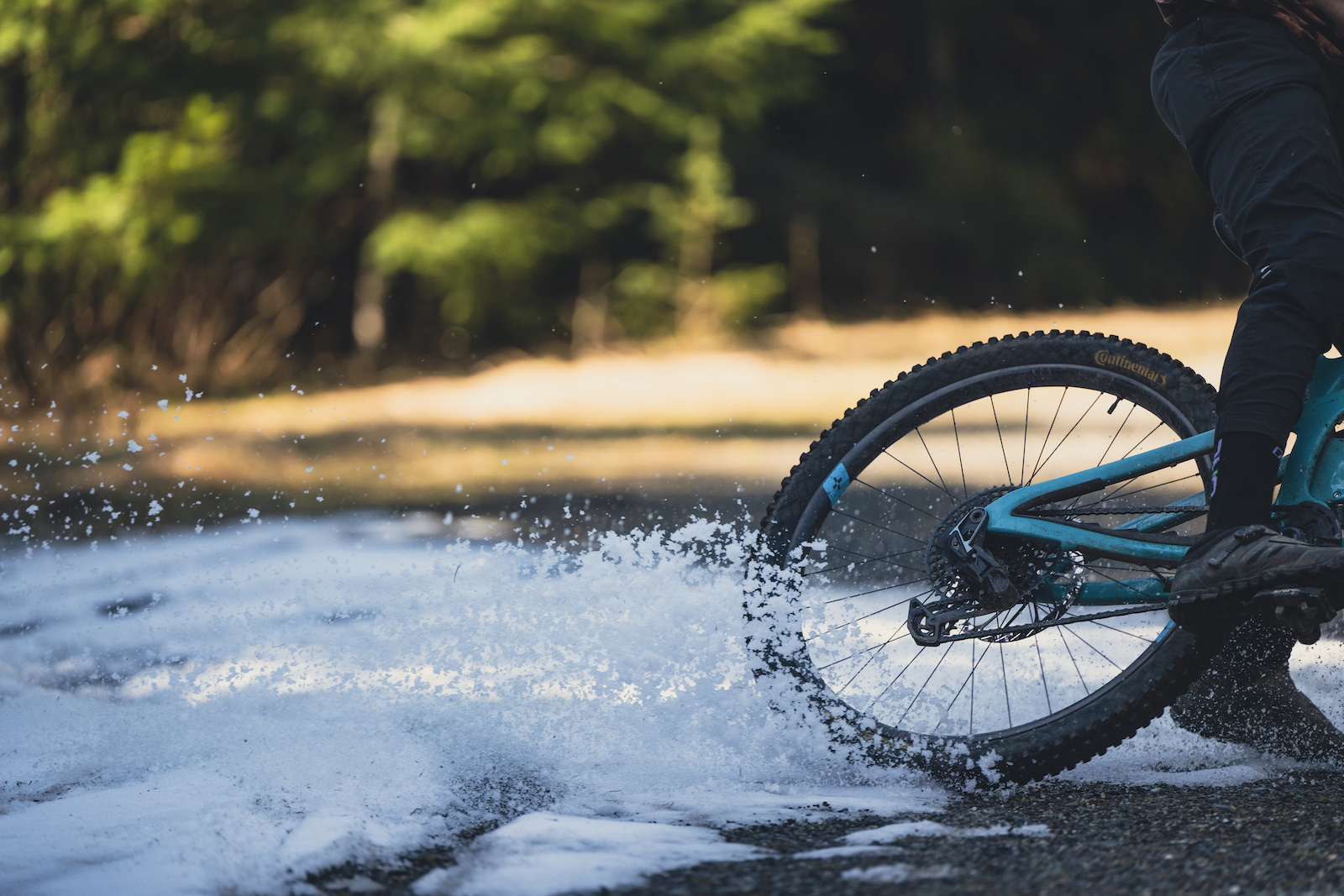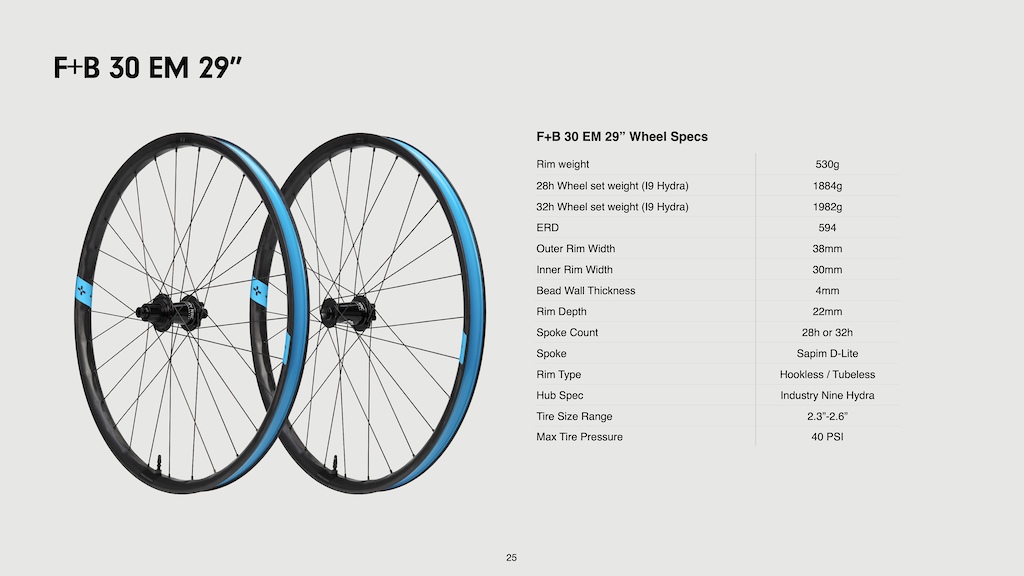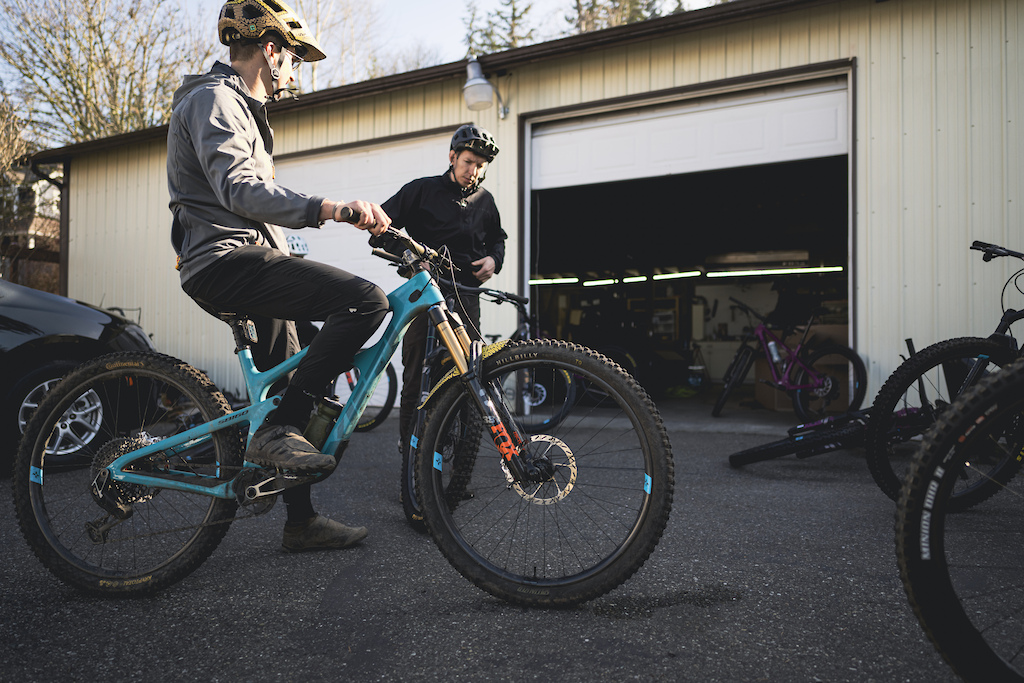First Look: Forge+Bond's New Thermoplastic Wheels
As the newest brand in the high-end wheel market, Forge+Bond is looking to do things a little differently. In order to accomplish this, Forge+Bond employs the novel thermoplastic composite technology pioneered by CSS Composites. The two companies are essentially one and the same, but Forge+Bond (F&B) is the market-facing result of all the R&D that CSS conducts.
F&B is unveiling their brand with a simple lineup, featuring a 29" enduro wheelset, as well as a gravel wheelset for the drop bar folks out there. We'll be focusing on the mountain side of things, with some early ride impressions later on.
F&B is unveiling their brand with a simple lineup, featuring a 29" enduro wheelset, as well as a gravel wheelset for the drop bar folks out there. We'll be focusing on the mountain side of things, with some early ride impressions later on.
F+B 30 EM Details
• 28 or 32 hole
• Internal rim width: 30mm
• Made in Gunnison, Utah
• Lifetime warranty
• Weight (29" 32h Centerlock Hydra): 1982 grams
• Weight (rim only): 530 grams
• Price: $2,599 USD
• forgeandbond.com
• 28 or 32 hole
• Internal rim width: 30mm
• Made in Gunnison, Utah
• Lifetime warranty
• Weight (29" 32h Centerlock Hydra): 1982 grams
• Weight (rim only): 530 grams
• Price: $2,599 USD
• forgeandbond.com
Core to the philosophy behind the thermoplastic construction technique is the environmental responsibility they tout. With a process that essentially eliminates waste, and a post-life recycling program, F&B is aiming to keep the embodied energy and material in a closed loop. While the recycling concept is quite compelling, it currently only allows for them to make smaller ancillary items, like these tire levers, which you can purchase on their site for $50 USD.
CSS and F&B are working on further projects with the recyclability of the material, but the relative lack of manufacturing waste is an accolade worth focusing on in the meantime. Where traditional epoxy-matrix carbon parts generate quite a bit of waste, the FusionFiber process minimizes the amount of offcuts or byproducts.
Like any good composite manufacturer, Forge+Bond have put in a lot of time fine-tuning the layup of their rims, with a focus on durability and performance in addition to the vibration-damping characteristics inherent to the thermoplastic construction. This is the area in which F&B hopes to improve upon former FusionFiber wheels, as the durability of prior designs was a bit lacking relative to similar-weight epoxy carbon alternatives.
While the novel material is a large part of the reduced environmental impact of the FusionFiber technology, the manufacturing chain and efficiency of production are a big part of what set these rims apart. CSS developed this graphic to help explain the differences between traditional carbon processes and their method, and bias-aside I think it does a good job of arguing for the latter.
Riding the Forge+Bond 30 EM Wheels
Unless they are extremely light, extremely stiff, or very low quality, it's pretty rare that a set of wheels makes a drastic difference to the immediate ride-feel of your bike. That remains the case with these thermoplastic hoops from Forge+Bond, but don't read that as a bad thing. I've been riding these wheels quite a bit over the past few weeks, and though the general takeaway is quite neutral, there are some aspects worth noting.
Compared to the other FusionFiber wheels I've spent time on (Evil's Loopholes and Revel Wheels), the Forge+Bond 30 EMs seem to be a little less damped across chattery terrain. That's likely due to the beefier construction to better hold up to the rigors of enduro racing and generally heavier riding, as the other two options have developed a bit of a reputation for poor durability. The other upside to that heavier construction is that the F&B wheels hold up better in hard corners and sideways compressions when you're really pushing through the bike.
The closest ride-feel proxy I can think of are the new We Are One Convergence wheels, which feature very similar build specs, but a very different rim design philosophy. (Stay tuned for more thoughts on the Convergence wheels soon). Both are composed in off-camber chunkier terrain, but precise when you want to push the bike in specific compressions, making for a very nicely performing wheelset. Ultimately, I think the wheelbuilding details like cross pattern, spoke tension, spoke count, etc. make a as big a difference as minute changes in the carbon layup of a rim, so the best thing you can do is take care of the wheels you have and make sure they're rolling true before smashing them into another rock.
Though I haven't had the F&B wheelset long enough to give them a through thrashing and long-term durability test, they've held up very well to my use thus far. I've ridden them in and around Bellingham, as well as up on the North Shore, and even in some of the latter's nastier terrain they haven't gotten out of shape or lost any tension. The high speed g-heavy turns in Bellingham tend to de-tension wheels pretty quickly, but the thermoplastic hoops are still holding on tight to their fancy hubs. We're looking forward to testing these wheels in faster and rougher terrain to see how they shape up in the long term.
I'll save most of this for a different platform, but I'd love to see more high-end wheelsets speccing hubs other than the I9 Hydras. While the Hydras do provide the highest engagement of any pawl-driven hub out there, I've had my fair share of durability issues with them over the years. Luckily, they're easy to work on, and the team there is helpful with any issues that may arise. My main bias is towards quieter, simpler hubs like the old-model DT Swiss options, where reliability and simplicity makes them simply fade into the background.
Finally, a word on price. These are some of the more expensive aftermarket wheels we've seen recently, coming in a few hundred dollars over other domestically-manufactured options. Again, the closest comparison here is We Are One, whose Convergence wheelset costs around $1,800 USD. I think the choice here comes down to what you value, as the price reflects a bit more than just a high quality and effective pair of wheels. With their Utah-based manufacturing and zero-waste process, Forge+Bond presents a compelling case for being one of the more environmentally conscious options out there. I say this pretty often, but in the end the most eco-conscious thing you can do is buy nothing - though these are a pretty solid second option.
To wrap things up, here's the Forge+Bond brand launch video, featuring some heavy djent tunes.
Riders include a few of the F&B athletes, such as: Jill Kintner, Mitch Ropelato, TJ Eisenhart, Sydney Nielson, Iago Garay, Andrew Dahleim, and Truman Glasgow.
Author Info:
Must Read This Week







A price tag as high as the one of some entry level bikes.
A carbon wheelset that is heavier than a set of Newmen SLA and 4 to 5 times the price.
And "recycling" in a form that is no step forward because they only shred the fiber and reuse it as overpriced tire levers.
I was interested in a Revel Rover gravel frame, but it’s legit a full pound heavier than most carbon frames, which is a lot in curly-bar world. I just don’t see the advantage of this technology, beyond maybe saving labor on the production side.
If they last another 6 months like that they'll officially be cheaper than if I bought an alloy rim and had replaced it three times. AND they have a lifetime replacement policy!
The real comparison is other good carbon rims. If I can get a proven WAO wheelset for $700 less, why would I get these?
“There’s a sucker born every minute”
It’s really amazing that a company would create a product that that is competing with similar products produced in the same country, using the similar materials and labor, but with a price tag 30% higher.
Someone needs to tell the investors to save their money
ALSO a poem for you: A wheel that Mitch doesn’t break is expensive to make.
The wheels are really good, a lot has gone into them.
A fool and their money are easily parted.
They may be luxury but the prices these days are ridiculous
I like it!
As was pointed out early, it's called Greenwashing and it's profit-driven not protection driven.
But, my teammate with the WAO's (who is undoubtedly a faster rider) blew one the hell up on a practice lap. It happens to any rim under enough stress, not the WAO's fault, but you can't "limp" a carbon rim. It's toast and if you want to keep racing you'll need a spare or a real fast spoke lace-er.
Alu rims are inexpensive, easily sourced, and can be run within an inch of their lives, in my opinion, that makes them indispensable to anyone racing on their own dime.
I would argue that carbon rims with a good warranty make more sense for the cost-conscious racer than going through how ever many aluminum rims in a season and paying to replace them.
Revel doesn't make frames in the USA. Repeat, they don't make frames in the USA.
And even as someone who believes modern thermoplastic carbon is a superior frame/component material, I can't justify that price tag.
But now you (rather spuriously) come to mentioned it. I think I would take the change left over from an ordinary set of wheels and spend it on drugs.
It's all just opinion here, not necessarily complaint, there are reasons why people think these and other pricey components are probably not worth it for the average rider, eg.
You don't rely on the indestructibility of your wheels for some endurance event, race, competition.
You don't regularly break wheels.
You don't believe the price of something imbues you with more self-worth.
You don't fetishize ground breaking or just the latest engineering concepts without some cynicism.
You would prefer to buy more bikes for the money you would spend on wheels.
If you have the patience to wait on the warranty, yes, carbon rims aren't a bad value.
Yet here we are despite all our armchair engineering brain- (and chair-)power, regurgitating the obvious. It is ok to ask questions or make statements. Just skip the overly obvious stuff.
Assuming you don't own these rims in the artice, enjoy but take it easy on the drugs.
It's not all that obvious what is obvious to others, hence the opinions, the tech is interesting, the price prohibitive.
- 80% energy saved
- 95% (...) emissions eliminated
We made all this reductions so as we can price it as carbon but with a profit margin of a diamond.
I've no doubt there is massive savings, but what is this 80% based on? their actual production volumes or some scaled up model to maximise their claims. Why can't they just market it with real data instead of some weird graph.
All joking aside. The Current Banshee Rune will let you run 26 still.
I purchased a 4x set of fully custom (manufactured to order, to my own size and offset specifications/color), partially forged, performance rims and tires for my car. These came in at 10 lbs. lighter per wheel than the stock, performance wheelset and shipped with Michelin Pilot Sport AS4 tires for $2,100 + tax. Also, these wheels were manufactured by a smaller, independent company, and were sold through a dealer (therefore, there must have been sufficient margin in the stack).
I simply do not buy that there is anything that justifies these $2k+ mountain bike wheelset prices, aside from the fact that they support a passion or hobby and are therefore inflated.
Moto / auto industry operates under much smaller margins. Bike margins are shrinking and you can see this affect in a lot of small shops that don't operate efficiently. Antiquated owners are starting to feel the heat of shrinking margins and unable to adjust their business models to get with the times.
I do want to note here that my above comments aren’t intended to make an ethical argument for how the market should work. Just hoping to shed some light on how it does work to combat all the rumors, emotionally charged rhetoric, and misinformation out there about how the bike business works.
also mountain bike industry: look at these over priced wear items made from carbon fiber!
(before i get flamed, yes i know wheels aren't typically a wear item. however, here in the az desert i would argue that)
It'd just be great to see true apples to apples comparisons to put these companies on blast that they're actively fudging numbers to justify their exorbitant costs.
That's exactly what they did with the Revved frames. They saved a boatload of money on developing their own manufacturing tooling and rigs rather than buying some other companies super expensive off-the-shelf option.
CSS isn't that. From the very get-go, they spent a ton of money and immediately needed ROI, so they heavily marketed their product via "hip" outlets like Revel, Evil and Chris King. Forge+Bond is just bringing that marketing in-house so they can sell to whoever they want without marking their product down for another brand.
Unfortunately, they are doing the opposite - they are marking UP their products in a Direct-to-Consumer model, which makes no sense.
This is classic capitalistic luxury good pricing strategy. If you charge a lot of money you'll set yourself apart as being the best simply because you charge a lot of money. How'd that work for Kitsbow?
In reality, no one will "recycle" these wheels. Globally, 5% of plastics are recycled. 95% are not, due to costs to recycle it. It is cheaper to make new plastic. We should be burning plastics in power plants, with scrubbers.
But……perfect for the build with a colorful but fragile i9 stem and too-heavy 5dev crankset.
You want a strong, recyclable rim? It’s called an EX511. Nipple washers mean it’s all aluminum, all the time. And weights the same as these.
f*ck this company, hope they go bankrupt and everyone involved in building this brand loses their asses purely for them having the audacity to try to normalize exorbitant overpricing of shit.
Sorry but its pretty unappealing to see a bunch of graphics about how their manufacturing process saves $$$ and then they have a price legitimately twice that of their competition.
Why push sustainability if aluminum is far more sustainable?
Justify the exorbitant price, I sincerely want to know.
Revel, Evil, Chris King, Nobl, Santa Cruz, I9, WAO, Raceface, Enve, DT Swiss, Roval, E*13, ZIPP, Ibis, Bontrager: "what the hell man"
What a greenwashing load of bullshit.
Parts list:
$115 NEWMEN Front Hub MTB FADE Straightpull 6-Bolt silver 15x110mm Thru Axle BOOST
$215 NEWMEN Rear Hub MTB FADE Straightpull 6-Bolt silver 12x148mm Thru Axle BOOST
$82 NOTUBES Rim 29" ZTR Flow MK4 28 Hole
$80 RACE FACE Rim 27.5" 650B ARC 30 Offset 28 Hole
$688 Berd custom wheelbuilding
$1,180 total
+
$32 76projects high flow valves
$1,212
About 130g too heavy on the rim and 300g+ to heavy on the wheelset.
If you choke on your breakfast when reading that, does your partner sue PB or F&B?
80% emissions reduction
95% of dust eliminated
99.5% profit margin
What????????
Alu.. ohhhyeahh